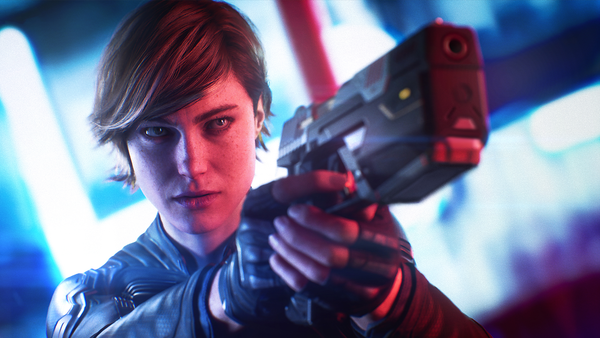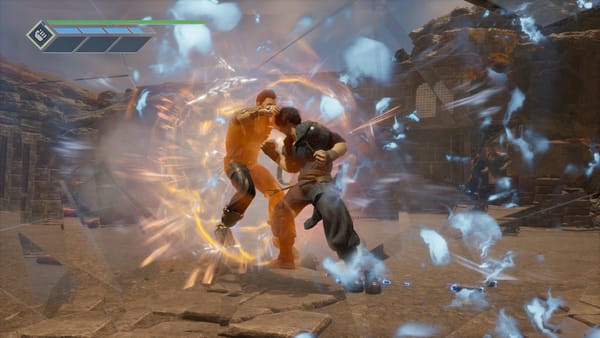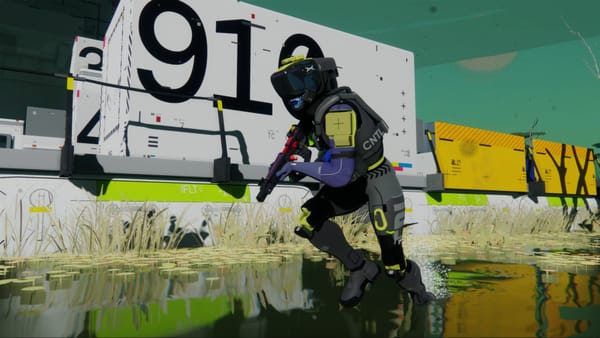#165: Share button
Offering Call Of Duty to Nintendo is a PR masterstroke that might tip the balance in the battle for Activision Blizzard, without really changing a thing.
Oh, good, we’re writing about Activision Blizzard again. To repeat what I said to paid subs on Monday, when this is finally over I’m writing about nothing but fireballs for a month. Fireballs and parry mechanics.
Overnight Phil Spencer, CEO of Microsoft Gaming and owner of the world’s largest collection of videogame t-shirts, made a couple of new commitments aimed at getting the Activision deal over the line. He pledged to match the 10-year Call Of Duty guarantee already offered to PlayStation on Steam as well. He also revealed that Microsoft had offered the same to… hang on, this can’t be right… Nintendo? Surely not.
Let me start by saying that the Steam offer is very surprising, truly commendable and really quite persuasive. It represents a genuine concession from Microsoft, giving up what by common consensus is the prize trophy of the Activision buyout at a time when it is trying to bolster its presence in PC gaming through Game Pass and the Windows Store (and of course by buying Blizzard). As Epic Games can attest, PC players are not as mobile as the inherent openness of the platform might suggest; they like to keep their game libraries in one place. Keeping COD on Steam for a decade, then, is a real sacrifice for Microsoft to make.
Nintendo, though? Mmm. This is the classic solution in search of a problem, is it not? I am not aware of any great clamour for Call Of Duty to return to Nintendo platforms; I do not see it selling particularly well, let alone driving hardware sales. I am sure that, given the choice between having it and not, Nintendo would say sure, go ahead. But I doubt the offer has sent many champagne corks a-popping at NCL in Kyoto, or even NOA’s Redmond HQ.
The offer reminds me of a former employer which, after conducting approximately its 84th round of layoffs in the space of about four years, introduced a new policy designed to placate the overworked, downcast and suspiciously blood-splattered staff who had managed to escape the latest cull. You now have an unlimited holiday allowance, they said. On paper, this was a great offer: you could safely take a day off in July for a kid’s sports day or friend’s stag do without fretting about whether you’d have enough PTO in the bank come Christmas.
In practice, your enormous workload — and a new layer of anxiety at leaving your colleagues to pick up the slack in your absence — meant you probably took the same amount of time off as before. Some studies have even shown that people end up taking even less. It is smoke and mirrors, a sleight of hand that makes a company look like a kindly benefactor without actually needing to give you anything at all.
You can see where I’m going with this, I’m sure. Sure, this costs Microsoft money, since it will have to develop a game for a platform for which it isn’t currently being made. But its cost in business terms, in market share, is negligible. This isn’t going to lose Microsoft any Xbox sales, or Game Pass subscriptions; it is not handing much of a boost to Nintendo. It is a concession on paper, and paper alone.
Yet there is a certain risk in promising Call Of Duty to Nintendo, a company that historically has shown about as much interest in pushing the technical envelope with its hardware as I have in… well, playing the new COD in 540p on my Switch. As we all know, in multiplatform development a game’s ambition is typically reined in by the weakest platform for which it is being made. What compromises would this year’s Modern Warfare II have required in order to run on Switch, and how might those sacrifices have impacted the versions that shipped on more powerful platforms? What happens to something like Warzone 2 when you have to offer cross-play with a Nintendo console?
Let us cast our minds back to 2013, and the last time we saw a Call Of Duty game on Nintendo hardware. Here’s the conclusion from Digital Foundry’s performance analysis of Call Of Duty: Ghosts:
“The real letdown comes with the Wii U version, which sees owners of Nintendo's console once again left with a subpar experience marred by frequent framerate issues and some pretty striking texture-quality problems that makes it hard to recommend when both 360 and PS3 offer up smoother gameplay and more enjoyable online play as a result.”
Mmm. Quite.
Sure, it will likely be a few years before we see Call Of Duty release on a Nintendo platform, even if the deal goes through in a few months as Microsoft hopes. It’s not like Infinity Ward or Treyarch can simply check a box and compile a Switch version overnight. By the time COD is ready for its Nintendo reawakening there will surely be a Switch successor on shelves — but whatever the shape of its next console, history suggests Nintendo is hardly likely to try and match Series X and PS5 for power, much less surpass them. A cloud-only release would be one way around it, I suppose; maybe Microsoft could make a custom port of Call Of Duty Mobile instead, and consider their obligations met. Quite how regulators might feel about that, however, is another matter.
So, let us call this what it really is: a naked PR play designed to convince regulators that Acquisition Blizzard will promote competition, rather than strangle it. I have to say I respect it. It is very clever indeed. Will this make the difference? Heaven only knows. The story is changing by the day at the moment, and becoming increasingly hard to call with each new twist. But the wind increasingly feels like it’s blowing with Microsoft — even if much of it is little more than hot air.
MAILBAG!
Not a sausage — I guess I’m not the only one in full-on Christmas mode already — so let me talk briefly about Hit Points’ end-of-year awards. Paid subscribers are also getting involved in the festivities, submitting bite-sized writeups of their game of the year for publication in a sort of full-length MAILBAG in the week before Christmas. If you’d like to get involved, a paid sub costs just £4 a month, and you can find all the details on how to submit your entry here. Join us!
MORE!
Microsoft is joining Sony and the major publishers by raising the price of firstparty games to $70 from the beginning of 2023, just in time for Starfield et al. Bit of a pisstake, this. Riding consumer goodwill by resisting a price increase while you’ve hardly any games coming out, then hoiking prices in line with everyone else when the big releases finally loom over the horizon? Hmph. But hey, we’re all getting them for free-ish on Game Pass so, you know, whatever.
Three hundred QA staff at Zenimax Studios have announced their intent to unionise with the Communications Workers of America. Microsoft, no doubt mindful of regulatory scrutiny of Acquisition Blizzard, has said it will not stand in the group’s way. The fact that the CWA has this week loudly lent its backing to the acquisition has presumably helped grease the wheels even further. I doubt we have heard the last of this sort of thing; if you work under the Microsoft umbrella there has never been a better time to organise. Chop chop.
While labouring with Covid, Hit Points failed to bring you the news that Sonic The Hedgehog creator Yuji Naka had been arrested for insider trading. A tremendous source of regret, that, since it also meant I did not have the opportunity to alert you all to the best tweet of the year. I shall embed it now by way of recompense.
Absolutely savage. Anyway, Naka’s been arrested for insider trading again, this time for being part of a group who invested some $834,000 in ATeam Entertainment after they learned that their then-employer Square Enix was partnering with the studio on a Final Fantasy mobile game. Pretty shocking, this, and really quite stupid — Japan’s insider-trading laws stipulate a fine of up to 5m yen, and up to five years in prison.
Staff at CD Projekt subsidiary Spokko are facing layoffs after the parent company announced plans to shutter Spokko’s Pokemon Go-ish mobile game The Witcher: Monster Slayer, and merge the studio into CD Projekt Red. Some staff will be given new roles on Red’s core teams; others will be shown the exit door. Mobilegamer.biz reckons Monster Slayer made just $5k revenue last month.
Ailing US retailer GameStop has embarked on its third round of layoffs this year, just in time for Christmas. Among those impacted are the new team tasked with delivering on the firm’s NFT ambitions; among those not impacted is CEO Matt Furlong, who trousered $16.8m last year. Standard.
John Garvin, writer/director of the swiftly forgotten PS4 exclusive Days Gone, has blamed the game’s poor reception on “woke reviewers” who “couldn’t be bothered” to play the game. Just take the L and get on with your life old stick, this nonsense will get you nowhere.
You’ve a few more hours to cast your votes ahead of The Game Awards tomorrow evening. Personally I’d recommend honouring Sam Barlow for his Yuji Naka tweet by voting for Immortality at every available opportunity. And when you get to the esports bit, just pick whoever you think looks the most toxic.
England goalkeeper Jordan Pickford has carted a high-spec laptop and monitor to the World Cup in Qatar so he can wind down with a bit of the ol’ Fortnite. Why go to all that fuss when you can play Fortnite on just about anything? “Just trying to get the best frames and that,” he said. Good man.
Right, that’s your lot! I’ll see you all on Friday for a Game Awards debriefing. Kindly hit the buttons below in the meantime.





